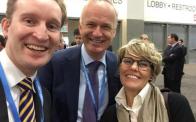ALERT!
This site is not optimized for Internet Explorer 8 (or older).
Please upgrade to a newer version of Internet Explorer or use an alternate browser such as Chrome or Firefox.
Joel Dunning
Joel Dunning, FRCS, PhD

Video(s)
Background
I did my medical school training at Oxford University at a time when evidence based medicine was taking off. I then went to Manchester for my junior doctor positions and worked for Professor Mackway Jones who had just set up Best Evidence Topics in Emergency Medicine. He encouraged me to set up a 10 centre study in children's head injuries that became my PhD and I helped NICE to create National Guidelines in this area.
I then entered Cardiothoracic Surgery and continued projects in Evidence Based Surgery first inspired by Prof Ludwig Von Segesser to create Best BETS in Cardiothoracic Surgery for the ICVTS and then by Sam Nashef on the EACTS Clinical Guidelines committee to start to produce guidelines for our community.
I am currently promoting guidelines for the management of arrests after cardiac surgery which I still think is the most important guideline that I have ever helped to create and has the potential to save the most lives and this has led onto the creation of the CALS course ( www.csu-als.org) and also a course for emergencies in the catheter lab called REACT. We also wrote a 9 society guideline for this.
Clinically I spend a lot of my time doing minimally invasive Thoracic Surgery. I particularly like trying our new techniques for both robotic and VATS surgery including subxiphoid approaches for lobectomy and the thymus. I am a proctor for Intuitive and for Cambridge Medical Robotics.
In England we had a very significant issue with lack of access to surgery for Pectus deformities. I have helped to set up a National MDT for pectus, We wrote an international Pectus Best Care guideline published in the EJCTS and I am chief investigator of the RESTORE Trial which is a £2m NHS funded project to determine the cardiovascular benefits of surgery for pectus excavatum.
And of course I love making videos, being involved in CTSNet and watching all your videos, so if you have anything great that you would like everyone to see, please get in contact and we will get it posted for you !!
Other Interests
EACTS guidelines for resuscitation after Cardiac Surgery.
EACTS guidelines for antiplatelet and anticoagulation management of patients undergoing cardiac surgery
EACTS Guidelines for preoperative medications after cardiac surgery - due late 2016
EACTS guidelines for the Management of Atrial Fibrillation
EACTS guidelines for the Surgical managment of Atrial Fibrillation
Cardiothoracic Advanced Life Support - guidelines for cardiac arrest in the CICU www.csu-als.com
Best Evidence Topics in Cardiothoracic surgery at www.icvts.org
Associate Editor of the EJCTS for Cardiac surgery
Co-Editor in Chief of CTSNet
NICOR research and development board
SCTS academic and research board
Research
Chairman of the EACTS guidelines for perioperative medications after cardiac surgery
Chairman of the STS Expert consensus guidelines on the managment of arrest after cardiac surgery due for publication Jan 2016
1st author of the Pectus Care multi society guideline. published 2024
1st author of the joint british societies guideline on the management of cardiac arrest int eh catheter laboratory.
PI of VIOLET Study ( VATS Versus open lobectomy RCT)
PI of PULMICC ( Surgery versus conservative treatment for colorectal metastases)
CI of radiolabelled lung nodule excision study at James Cook University Hospital
CI of the RESTORE Trial ( RCT of 200 patients undergoing pectus excavatum surgery)
CI of the CRYPTIC trial ( RCT of Cryoanalgesia in Robotic Lobectomy )
Additional Educational Information
Oxford University BA(Hons) 1994, BM.BCh(oxon) 1997
Royal College of Surgeons Research Fellowship 2002
PhD Manchester University 2004
Content Published on CTSNet
Practice Areas
- Cardiac
- Thoracic
- Cardiac
- Coronary disease
- Thoracic
- Diaphragm
- Lung
- Mediastinum
- Pleura
- Trachea and bronchi
- Professional Affairs


